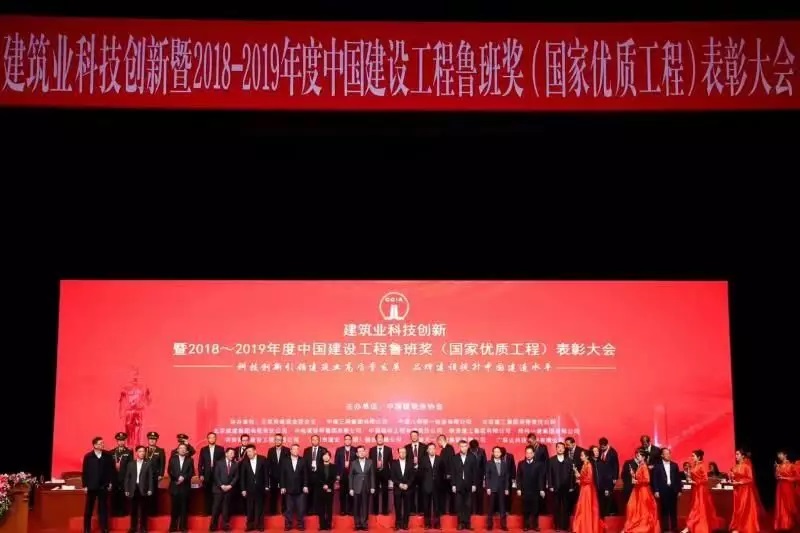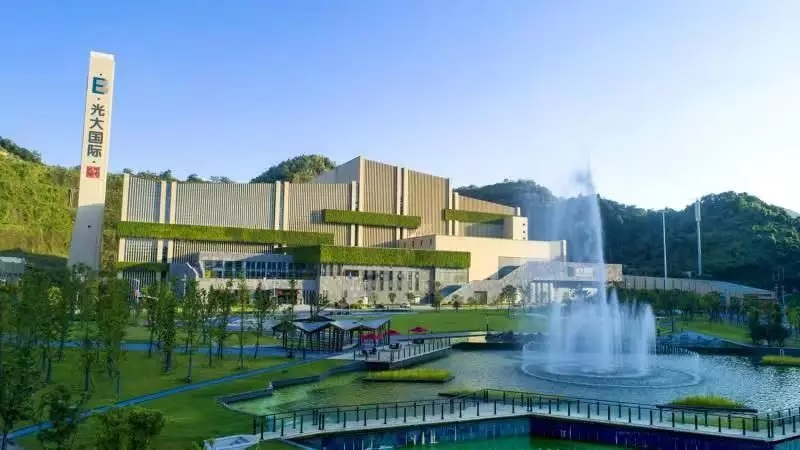News Release
16 Dec 2019
Everbright International Receives Luban Prize Again, Highest Recognition in China's Construction Field
On 10 December 2019, China Construction Industry Association (“CCIA”) held a conference on technological innovation for the construction industry, together with an award ceremony that granted Luban Prizes in China’s construction field for 2018/2019, which recognises quality construction projects in China. The construction project of Hangzhou Waste-to-energy Project (“Hangzhou Project” or the “Project”) of China Everbright International Limited (“Everbright International” or the “Company”) was shortlisted in the second batch of the Luban Prize in China’s construction field for 2018/2019. Previously, Everbright International’s Ji’nan Waste-to-energy Project won the Luban Prize for the very first time in 2013. Winning this prize again demonstrates Everbright International’s outstanding capability in planning, constructing, operating, and managing waste-to-energy projects.

Located alongside the Qiantang River with its verdant mountain ranges, the construction project of Hangzhou Project laid a solid foundation for the Project’s smooth operation. The planed area of Hangzhou Project was 209.55 mu, with a total construction area of approximately 73,194 m2, commanding a total investment of RMB1.8 billion. Hangzhou Project is mainly responsible for processing waste from the major urban districts of Hangzhou City. It is equipped with four 750 tonnes/day mechanical grate furnaces, and has a designed total daily household waste processing capacity of 3,000 tonnes, which means the Project is able to process 1.1 million tonnes of waste and is expected to generate 390 million kWh of green electricity, annually. It was initially launched in August 2014 and commenced operation in November 2017.

In terms of construction planning, Hangzhou Project adopted an innovative concept of toning down its identity as a factory, by taking into consideration the local ecological and geographical features, as well as integrating local cultural elements, the construction project of Hangzhou Project strived to achieve the effective integration of the local ecology, factory production and the local communities. At the very beginning of the construction process, the construction project had set a goal of winning the Luban Prize, the country’s highest honor for quality construction projects. The construction team accelerated the construction process with the highest standard, solid implementation and full strength, so as to achieve the best outcome. As a result, the Project has become a demonstrative project, which now stands both the test of time and against scrutiny from the public.

In retrospect, although the development of Hangzhou Project was challenging for Everbright International, the Project achieved excellent results. At the preliminary stages, in order to solve the “NIMBY” (Not In My Back Yard) effect and proceed with the construction, the project team promised that “the construction will not commence, if any legal violation is found or if the community doesn’t support the project”. In the meantime, the team tried to establish a positive interactive mechanism with the local residents, in which the local government took the lead, the Company acted as the major party involved, and the local residents were the influencers. The Project has been strict on its information disclosure and fully open to the public, which has gained understanding and support from the local communities. This has been helpful for re-launching the waste-to-energy project there. As the first waste-to-energy project in China that has solved the “NIMBY” effect successfully, Hangzhou Project has attracted much attention from society. Many mainstream media, including People’s Daily and CCTV, reported extensively on the Project.

During the construction process, the project team had to overcome many difficulties caused by the weather, terrain, and lack of supporting facilities. The team proactively planned in innovative ways to overcome those challenges. Eventually, the team built a superb project based on an abandoned stone factory by cutting into the whole rock mountain and backfilling over one million m3 of stone materials. The workload and difficulty of the construction work were huge and beyond expectations. In order to ensure the construction would meet the deadline, as well as maintain high quality and safety standards throughout the construction, the project team adjusted the construction plan whenever needed. The team arranged project supervisors and specialists oversaw the project construction work 24 hours a day in order to respond and solve issues in a timely manner, persevering through overtime hours and bad weather. Under the hard and skillful work of the construction team, the construction work of Hangzhou Project amassed achievements one after another. All construction work was completed in 18 months, achieving a new “Everbright speed”.
During the project operation and management, Hangzhou Project has adopted the most advanced domestic environmental protection technologies and the most stringent discharge standards. Everbright International’s projects have a proven performance in four aspects: odor management (no odor in the plant area and surrounding areas), factory appearance (clean and appealing plant environment), noise control (the noise level of the factory area meets both national standards and the requirements of the local community) and emission indicators (emission environmental indicators can be tested at any time and be found to meet standards). For fly ash, acid gas, heavy metals and dioxins, the Project initiated flue gas purification processes, such as SCR, wet deacidification, GGH and flue gas bleaching. The hourly average level of online monitored gas emissions is superior to the Euro standard. As for leachate, the Project has adopted the third generation of Everbright International’s leachate treatment technology, through which waste water can be fully reused and achieve zero discharge after treatment. For slag generated during waste incineration, the Project is able to transform the slag into environmentally-friendly bricks for reuse. This contributes to the harmless treatment, reduction and reuse of waste. Currently, Hangzhou Project has been included in the United Nations’ “Case Studies on Waste-to-energy Projects”. It has won many honors, including the 2019 China Power Quality Project, 13th China Steel Structure Gold Award Project (first batch), and Green Development Benchmarking Enterprise.

Mr. Wang Tianyi, CEO of Everbright International, said that it is gratifying that Everbright International has won many accolades. The Company should cherish these honors and continue putting in more effort, adding that the Company would take this award as an opportunity to continue developing the spirit of indomitable determination and make persistent efforts for excellence and perfection. Everbright International would make sure to carry out more construction work, with higher efficiency, better quality and lower cost, in compliance with relevant laws and regulations, following safety rules and upholding integrity, in order to get well prepared for the construction for the next year and contribute towards growing into a world-leading ecological and environmental management group.
Background Information
The Luban Prize (National High Quality Project) is organised by the Ministry of Housing and Urban-Rural Development of the PRC, and is appraised by the CCIA. It is the highest honor in the construction field in China. The award is announced in two-year intervals, with no more than 240 construction projects each time.
Previously, Everbright International’s Ji’nan Waste-to-energy Project was awarded the Luban Prize (2012-2013).









